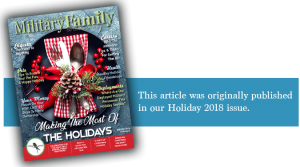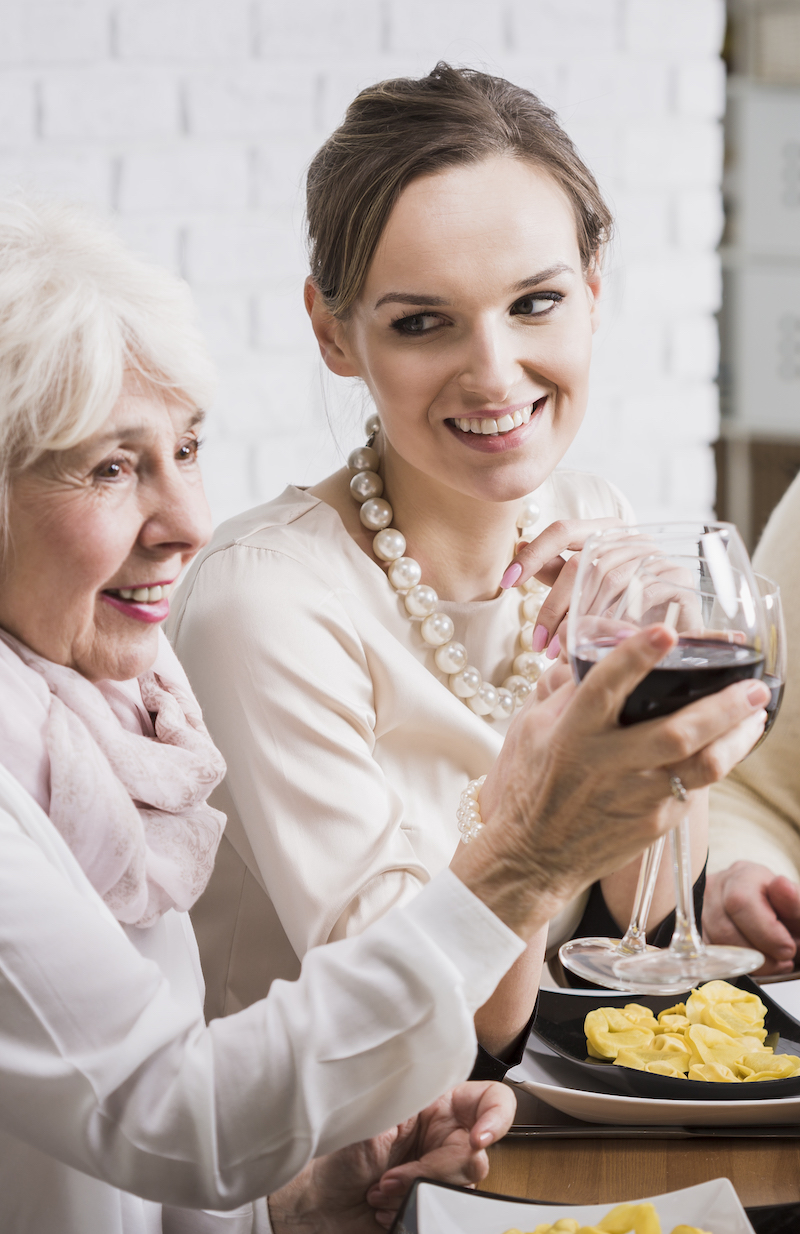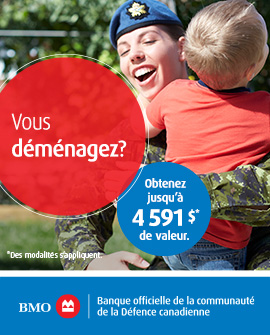 With chestnuts roasting on the fire and Jack Frost in the air, the holidays, in theory, should be the most wonderful time of the year. Cue the holiday tunes, trim the tree, and let the family gatherings begin. However, while the holidays may be a celebratory time for most, for some, the holidays may bring up pain, anxiety or loneliness, especially if a loved one is deployed or returning from a deployment.
With chestnuts roasting on the fire and Jack Frost in the air, the holidays, in theory, should be the most wonderful time of the year. Cue the holiday tunes, trim the tree, and let the family gatherings begin. However, while the holidays may be a celebratory time for most, for some, the holidays may bring up pain, anxiety or loneliness, especially if a loved one is deployed or returning from a deployment.
While the holidays could be a potentially stressful time, especially if you are feeling like the Grinch, watching the hustle and bustle and Christmas cheer yet struggling with the impulse to run and hide. Don’t worry, we have tips and tricks from experts on how to make the most of your holidays this year so you and your loved ones can have a happy and healthy holiday, even with obstacles that might stand in the way.
First and foremost, remember, there are resources and organizations that can help. Don’t be afraid to reach out to a friend, family member, or a group that can help you in your local community.
Adrienne Carfagnini, social worker and therapist for families and children for the last ten years, says many coping mechanisms for holiday struggles can be simple, planned, and customizable to each individual’s needs.

Dealing with Complicated Relationships
Going into the holidays with a realistic idea or plan on how you are going to handle situations that are inevitably going to come up is a great start. Typically, in the scenario of disliking members of your significant other’s family, you already know the person or people you are not going to get along with.
“There’s always that one person in the family who always makes a certain comment that drives you crazy, or you know, one family member that drinks too much, or an outspoken parent asking when you are going to have kids,” says Carfagnini. “Going into it with an idea of what you are going to encounter is good.”
Simple planning can include:
- Figuring out where you are going to sit at a family dinner. If you don’t like your mother-in-law, make sure you don’t sit beside her.
- Having a conversation with your spouse about how you can support each other while you are with family during the holidays.
- This can include splitting up time spent with the in-laws.
- Take a breather by leaving and doing something with you and your spouse and your kids, like going sledding, watching a movie, or visiting friends.

Anxiety During the Holidays
Many people, both civilian and military, struggle with many forms of anxiety. It can be heightened during stressful situations. Carfagnini suggests self-compassion and mindfulness during this time to alleviate the some of the stress.
“I talk a lot out this with my clients before the holidays because people get really worked up. Everyone wants the perfect Christmas. There is a lot of pressure around having a perfect tree, or making a perfect turkey,” says, Carfagnini. “Being mindful, and not setting your expectations too high, and giving yourself a bit of kindness and love when things don’t work out.”
Mindfulness is a way to stay aware of what’s going on around you, to remain in the present and not be overly reactive or overwhelmed by what’s going on around you. This is something that everyone has access to and can be done at any time, anywhere. If you aren’t sure how to practice mindfulness, there are many apps available to guide you through! Headspace, available for iOS and Android, is free and offers a number of guided sessions.
For some people, the anxiety comes from crowds and financial worry. Instead of stressing out and getting stuck in uncomfortable situations, there are many ways you can get your holiday errands completed without the fuss.
- Do your holiday shopping online
- Shop in small, local boutique stores
- Hire a third-party service to do your shopping for you
- Keep track of your budget and stick to it
Carfagnini offers other simple tips to calm anxiety, that can be used any time of year, especially during the holiday season.
- Watch your alcohol intake. Drinking increases anxiety. In the moment it will decrease, but in the hours or day after, it will be higher.
- Make sure you get enough sleep
- Take breaks! Carve out time to recharge
- Go for a walk with the family dog
- Go to the bathroom and take a few long, deep breaths
- Volunteer to do the dishes to take a break from the conversation
- Escape to the kids’ area and hang out with them. Most of the time, kids aren’t the problem
- Have a good conversation with your spouse about what’s s going on. Get support from them. Make sure you check in with each other and understand each other’s limits
- Have your spouse hold your hand under the table to ease your comfort level

Strategies for PTSD and the Holidays
Typically, people who have been diagnosed with PTSD should be receiving some sort of professional treatment or support. Usually, there are one or two coping mechanisms that work really well.
If you are living with PTSD, one tip Carfagnini stresses is to make sure you surround yourself with people who are supportive and who also know what you are going through. Having people on speed dial if they are not actually able to be with you also helps, like “phone a friend.”
Another tip Carfagnini suggests is limiting and reducing alcohol consumption and drug use to be able to be in a good space. Alcohol can be a trigger, and with it being so accessible during the holidays, it might be better to avoid it.
“I also encourage people to increase their self-care. Getting enough sleep, eating well, although sleeping can be tough for people who suffer from PTSD.”
The better you are able to take care of yourself, the better you are going to be able to manage all of the stresses that go along with the holidays.
Carfagnini says that it’s not all left to the person who is struggling with PTSD. Family members and friends can help play an important role by really taking the time to understand what’s happening to their son, daughter, wife, or husband.
In general, people assume what PTSD looks like on the outside, but it’s not always what’s going on on the inside.
“There are Veterans and active members who have PTSD who show a lot of aggressive behaviours, but it doesn’t show anything about the pain going on, on the inside, and the sadness or hurt. It can be very confusing for family members.”
Being flexible is extremely important. Not having high expectations of your spouse or family member. Don’t expect them to go to events with large crowds or loud noises. Sometimes all that’s needed is a calm, stress-free environment without judgement.

Dealing with Separation/Divorce Over the Holidays.
Dealing with a divorce, broken engagement or separation during the holidays can put the bah-humbug into your step. It can be especially tricky if kids are involved. The first holiday split between both families can cause a considerable amount of stress. Careful planning and anticipating challenges you might experience along the way.
Being mindful of how it is going to impact the kids, especially if it’s new, is essential. Making sure all the I’s are dotted and t’s are crossed and being a bit flexible will help with the transition. As well as some things are planned, they can still go wrong.
In situations like this, some couples can remain friends and keep the lines of communication open in a healthy way. For some, that’s just not possible.
Tips to cope and manage separations and divorces include:
- Never communicate via text. Text messages can be easily misinterpreted
- Write potential plans for the holidays on paper, email, or ask a neutral family member to be the mediator to help if the relationship isn’t on good terms
- Lean on friends and family for support
- Hire a third-party service that can help create parenting plans and help with the passing over of the kids to the other parent (Family Services Ottawa provides this service to families in the area, but other provinces also offer similar services)
“One thing I often tell clients is, you have to remember that bad behaviour often comes from a place of pain or hurt,” says Carfagnini. “Sometimes we don’t have the best feelings towards an ex-spouse, so understanding what the other person is going through, as well as yourself, can help you cope with the challenges that might come up.”

Addictions and the Holidays
The holidays bring a lot of temptation, and whether it’s food, shopping, or alcohol, it can be a difficult time for people struggling with addictions. It can bring up many emotions for a recovering addict: loneliness, anxiety, guilt, shame, and self-doubt.
Lana Robson, clinical lead of family services at Bellwood Addiction Center in Toronto says that what is a joyous time for most can be a daunting, emotional time for others. Not just for the individual in recovery, but for the family and loved ones as well.
Often times, there is a perception that family members don’t need help because they don’t think it’s their problem.
“Unfortunately, we see addiction as a family disease, so it’s important for family members and loved ones to also get some help and support for themselves.”
Robson says there is a lot of misconception between families and addicts. Family members think that when treatment is over their loved one will be fixed, and everything is okay, but what they don’t realize is that the real work starts when they graduate treatment, and recovery really stresses that.
Robson has many tools and strategies for both recovering addicts and their families to work on together during the holiday season.
- Should I stay, or should I go?
- Write down a cost/benefit plan, listing the pros and cons of attending a particular event
- Ask yourself “is this conducive to my recovery?”
Ask yourself three critical questions:
- What is this event really about?
- Is it appropriate for where you are at in your recovery?
- What are my motivating factors for attending this event?
- Connect with your sponsor/after-care group
- Lean on your trusted support system
- Don’t be afraid to ask the family member who is hosting dinner not to have alcohol present this year
If you are traveling out of the city, or even out of province, an excellent way to stay accountable during you or your loved one’s recovery is to make a list ahead of time of all the available meetings (AA, NA, etc.) before you go.
Addicts are people-pleasers. Because they have spent their addiction causing pain to themselves and their loved ones, they will often try to overcompensate for that.
Robson notes when it comes to people in recovery, it is important to remember, “they will try and exceed expectations of them from their family members. Most times, they are scared to be honest, to say how they are feeling.”










